|
Prior to crossing the Rhine the 8th Armored Division had been assigned to the 9th Army Group under the command of Gen. Simpson. I mentioned earlier that thousands of German soldiers were surrendering so fast that they could not be immediately ready for processing to a camp.
One night we were stuck with 200 German prisoners. A Private Johansen, a Swedish carpenter from Brooklyn, a Scandinavian by nationality was assigned and left to guard over 200 German prisoners. It was so funny to see this elfish Swede from Brooklyn guarding 200 soldiers of Hitler's Master Race. The powerful Wehrmacht had really gone down hill.
The famous British Tank Battalion, better known as the Desert Rats, were ahead of us and meeting little resistance. Road signs said Braunschweig was about 25 miles from Berlin. It looked like we were going to be involved in the capture of Berlin. But we were to be denied this honor.
All of a sudden our advancing columns came to a halt. Orders were received to stop and pull back to the Oder River. The reason given was to let the Russians advance to the Oder and meet the Americans there. This also allowed the Russians to capture Berlin.
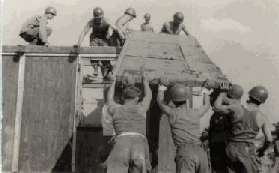
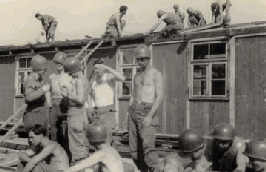
Winston Churchill, Franklin Delano Roosevelt and Joseph Stalin had "screwed us royally" by letting Russia take Berlin and to advance to the Oder River.
So we listened to our leaders. The armor turned around and retreated to the West and ended up in the quaint German town of Wolfenbuttel. On entering the town we set up our Headquarters and prepared to play a waiting game, waiting for the Russians to reach the Oder River.
Lt. Santy, who had replaced Lt. Campos after the Combat Fatigue incident, and I were driving around the town and noticed that many emaciated stripe suited concentration inmates were walking around carrying wooden boxes, or cases of what looked like Whisky, Liquor, or champagne. Stenciled on the side of the boxes were the words, "Fur de Wehemacht" (for the German Army).
We asked where they were getting these cases. They told us it was from a warehouse building down the street. I've forgotten to tell you earlier that Lt. Santy was prone to take a nip or two whenever it was available.
We went back to our company area, picked up a truck and a few very interested volunteers to help us on our mission of "liquor requisitioning". We returned to the source of the alcohol, the "drinking stuff". It turned out to be a German Army (Wehermacht) warehouse filled with alcoholic beverages of all kinds. Each case was labeled "Fur de Wehremacht". We had no feelings of guilt as we loaded our truck with many cases of assorted whiskey, liqueur and champagne. Then we realized we had a very serious problem. What do we do with 20 assorted cases of "Booze". The war was still going on. We couldn't just throw a big party.
We figured out an ingenious plan to take care of our "supply problem". We would use our lumber trailer for transporting our "Booze" (The Booze Express).
Engineer units carry lumber to build or repair bridges. We unloaded the lumber and constructed a box like area where we could transport our "liberated" booze. In this way we could transport our "booze" without it being visible. We thus completely enclosed the booze with lumber. Whenever we wanted to party or have a drink, all we had to do was lift the tarp, move some of the lumber and it was "party time". Don't ask what would have happened if we had suddenly been called on to build or repair a bridge. The members of the 1st Platoon, Sgt. Jozsa and Lt. Santy included would be in deep trouble. Fortunately the Russians took longer to link up the American troops at the Oder so we had a periods of time to work on the 20 cases of assorted booze. We did have some "mellow days".
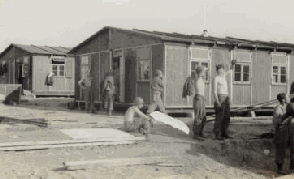
May 8th came and the war was officially over. We really celebrated that night. The trailer got lighter that day. My letter to my family on that day is in my scrapbook (and follows on the next page). . .
Of course the war against Japan was still going on so we knew that for some of us the war was not over. Although the war was officially over there still was some opposition and resistance in certain parts of Germany.
The army was also setting up Military Government in the German towns and villages to administer the civilian government. In some instances the Military Presence also had to be shown. Thus Army Units were then assigned to help police the area and to round up war criminals, "The S.S.". There were even pockets of resistance , which had to be taken care of.
Our company was then assigned to the town of Badenhausen in the Harz Mountains, a very beautiful part of Germany.
It was reported that there were isolated groups of young fanatic Nazi youth who refused to admit that the war was over (the jugend). We were thus assigned patrols in the Harz Mts., to track down these "Werewolves", as they were called. We didn't have any problems in our assigned area but there was some incidents in the Mt. Area.
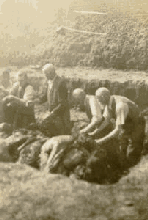
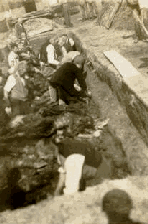
When it was determined that the Werewolves were not a serious threat, the patrols were stopped. Then the "top brass" decided that we had too much free time on our hands and needed more training to prepare for fighting the Japs. We went through the phases of rifle training, military courtesy, military sanitation and a review of our skills. It was also during this time the 1st Platoon was assigned to some very scary duty. The mission was locating and deactivating a large number of 1000 lb. aerial bombs that the Germans had left as a "booby trap" present for the advancing U.S. Army.
As the Germans retreated during the closing of the war, they mined most of the vital strategic bridges with a 1000 lb. aerial bomb in the bridge abutment. The Germans were very sneaky, to cross up the defusing the bomb by Engineers who were to dig up the bombs, the Germans would booby trap some of the bombs.
Our job was to, very carefully, dig up and around each bomb and check for any booby traps. We must have dug up about 25 of these bombs. The Army Photographic Signal Corps Unit was there one day as we were digging up one of the bombs. Somewhere in the dusty army archives there is a photographic record of the hazardous record of the 1st Platoon of the 53rd Armored Engineers.
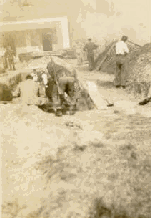
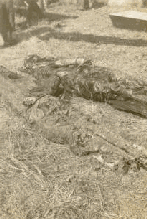
One day while down in the hold, working on a bomb, a voice above me called out "Is that the John Jozsa from the town of Muskegon Heights?" I looked up and recognized a fellow, Glen Erickson from the Heights who was a year behind me in High School at the Heights High School. We had a nice chat.
At the time he was a Lt. And also in an Engineering Unit. I never heard from him until Nov. 12, 1994 when he called me at home. He had seen my brother Lux's picture in the Muskegon Chronicle and recalled our meeting in Germany in 1945. He told me that he had been in on the "D Day" Invasion. It's a small world.
After a few weeks in the Harz Mt. area, we packed up and traveled to the Pilsen area in Czechoslovakia. We were going to do construction work on roads, bridges and barracks construction. We stayed in a school and the children in the town were very glad to see us as it meant, no school!
While stationed at the school in Zbruch, Czechoslovakia, I was promoted in rank to 1st Sgt. of Co A, 53rd Armored Engineers. I had made it through the enlisted mans rating system from Private to 1st Sgt. A proud day for one John N. Jozsa of 1527 Leahy Street, Muskegon Heights, Michigan. My Commanding Officer was Capt. James J. Gettings who had been our commanding officer from the time at Camp Polk in La., and all through the combat operations of World War II.
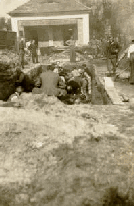
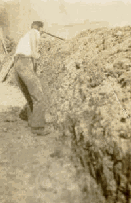
The previous 1st Sgt., Sgt. La Velle was married with children at home and therefore had accumulated enough points to return to the states and to be discharged from the service.
I was single, no children, so I lacked the necessary points to return to the states. I had more time to serve.
One of our first construction jobs in Czechoslovakia was to return to Germany and dismantle a large number of German Army Barracks and truck them to Czechoslovakia, and then reassemble them near Pilsen, Czechoslovakia for use of post war occupation troops, probably Russian.
Halfway through the reassembling of the barracks we heard we would be shipped out in a few months and that the Russians, who were stationed in the next town to us would probably occupy Czechoslovakia and occupy our newly reassembled barracks. It was a bitter pill for us to take. We had to resort to some devious work.
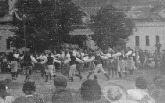
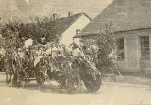
Needless to say, our construction crews did an excellent job of reassembling the transplanted German Barracks. However they didn't do a very good job on the nuts and bolts that were used to hold the reassembled barracks together. The construction crews actually "sabotaged" the reassembly. I could picture the whole barracks popping apart some night during a good windstorm. Weren't we the naughty Americans?
Another one of our jobs was at Regensberg, Germany on the Danube River. It was a repair job on the bridge over the Danube which needed to be reinforced.
We had set up our "tent village" on the banks of the fabled Blue Danube. It did not appear Blue to me.
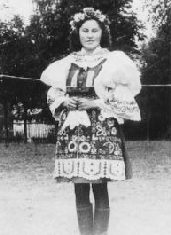
A short distance away from us there was a camp (lager) filled with hundreds of displaced persons (D.P.'s). These were European Nationals who had been transported from all over Europe to work in the hard pressed German Wartime Industries.
One day while the Company was working at the bridge site, I heard a very noisy commotion down the Company Street. It seems that some Displaced Person, a woman, was having words with one of our men. She was really emotionally worked up and was giving him a verbal "hard time". When she finally slowed down, probably to get her breath, I recognized that she was talking Hungarian. Now I am not fluent in the language but can understand some of the language.
I walked up to them, and using words I could speak in Hungarian and spoke to her. I asked her "What was the matter?" When she heard me speak her language she threw her arms around me and hugged me and treated me like a long lost relation.
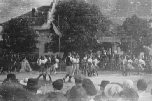
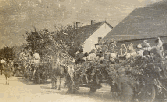
We did settle her problem. It had to do with her "contracting" for her doing his laundry. They agreed to the solution of the problem.
There were hundreds of other Hungarians at the "Lager". For the rest of the time there at Regensberg on the Danube River, they couldn't do enough for their "Magyar" friend. I was even the guest of honor at a wedding. I could have latched on to a nice Hungarian young lady. I did make some friends, but never got serious to bring one back with me to Muskegon Heights. We endeared ourselves to a large segment of Regensberg's population by providing them with fish dinners, of carp that is.
While working on the bridge we had occasion to use T.N.T. (the explosive tri-nitro-toluene). The explosives in the River caused many large carp to come to the surface. The Germans yelled . . . "More, More", so we threw in more blocks of T.N.T. and provided more fish dinners for them. They were not allowed by the government to fish.
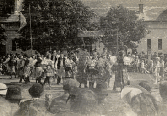

While in Czechoslovakia. We nearly got into another jam. This incident even had international diplomatic implications. Here is the story.
We were told to repair a bridge, a wooden structure. We had used up all our regular lumber (even our liquor trailer lumber) so I sent out our men to a nearby forest area to cut down some trees to use as logs for reinforcing the damaged bridge. How were we to know that the forests in Czechoslovakia are protected as national treasures and are therefore protected.
My men on my direction, had destroyed a part of a national forest. The Czechs had notified the U.S. Ambassador and demanded monetary restitution. Our State Dept. apparently took care of it. We never got a bill or punishment.
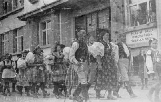
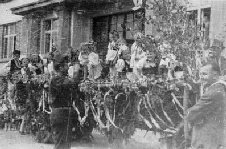
While still in Czechoslovakia the Army was involved in another Reorganization. Some of us were transferred from Co. "A" of the 53rd Armored Engineers of the 8th Armored Division to the 20th Combat Engineer Battalion. This meant I now had to be with a lot of new soldiers, most of whom were battle scarred veterans of much of the heavy fighting of World War II.
The new assignment was a real challenge but I got along fine with them and didn't have any serious problems. I still had Capt. Gettings as my Commanding Officer as he had been transferred with me to the 20th Engineers.
While staying in the school at Zbuch near Pilsen (the home of the famous Pilsener Lager Beer) we had occasion to set up our own "Company Bar". Everyone wanted the duty as Bartender. I supervised the operations. I checked it diligently.
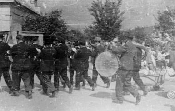

While at Zbuch it was discovered that the German Occupation Forces had executed some Czechs and buried them in mass graves outside of one of the neighboring towns.
The Czechs forced the German citizens to help dig up the mass graves. One of our Company Men, a Corporal Uhren took pictures of the exhumation. He took the pictures. I ended up with a set of his pictures, which are now in one of my Photo Albums.
We were still in Zbuch in the fall of 1945 and their annual Fall Harvest Festival. The towns always have a very colorful Festival with everyone dressing up in their native Czech costumes. The occasion celebrates with all kinds of activities, parades, dancing, drinking, etc. I took a lot of pictures of the Festival. I only wish they could have been in color. These are also in my Photo Albums.
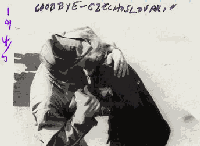
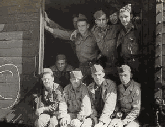
The war against Japan ended in August 1945 and we all looked forward to finally going home. All kinds of rumors were going around as to when we would be heading home. Then one day in late August we received our orders to leave Czechoslovakia.
We were to go by rail, that is, wooden boxcars out of Czechoslovakia, across Germany and France. We were not told of our itinerary or our route or our destination. They told us that we would be in transit for about three days.
It was an interesting trip. We had to eat and sleep and perform our bodily functions within the limited confines of our own little "Box Car".
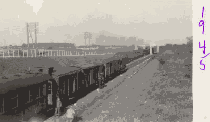
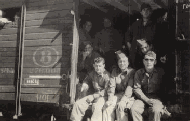
We existed on boxed army rations; both the "K boxed" and the "C canned" and water. One day we did have a break from our "army ration menu", somewhere in Germany (as we had no map to guide us). The train stopped at a siding to allow a more important train to pass. There was a field of cabbages alongside of the tracks that some industrious German farmer had been tending to harvest. We were hungry, we harvested.
I can imagine the look on his face the next morning when he came out to his field of cabbage, to find it almost completely stripped of his crop of cabbage. There were no tears shed on that train for the German farmer. We figured it was his contribution to our "war effort". We felt that we were paying back Adolf Hitler for the trouble he had caused for all of us, so we took his cabbages. A fair exchange.
During our trip across Europe, we had seen some nice scenery while traveling westward and had turned south as we reached France. We ended up finally in Southern France, at the Camp Calais Staging area known as Camp Victoret and was located on a giant, barren plateau near Marseilles, France.
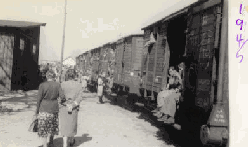
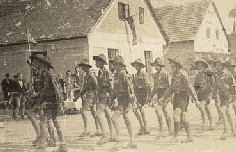
We were told that troops were stationed or held there temporarily while waiting shipment home or to Japan. It was a huge area of tents and accommodated thousands of G.I.'s. We thought that we would be there for only a short time. The short time expected, stretched in the long time of nearly two months.
Since we supposedly still "in transit", our personnel records and pay records were not with us so we could not be paid. We existed by going into Marseilles and selling our cigarettes and candy ration, army souvenirs or army equipment. The French Black Market supported us for those two months.
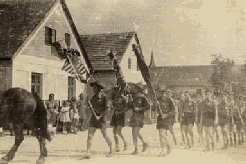
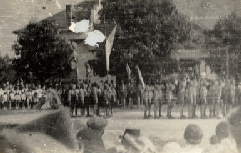
The U.S. Army, at this time was trying to recruit officers for Army Occupation Duty in Japan. The Army was offering high ranking non-commissioned officers the supposed "carrot" the Silver Bars of a 2nd Lt. In addition to immediate transit to the states a 90 day furlough in the states was thrown in for signing up for a 2 year "hitch" in the Japanese Army of Occupation.
Needless to say, some accepted this offer. It was not attractive to me. I had had enough of the U.S. Army, almost 4 ½ years. I wanted to go home and out.

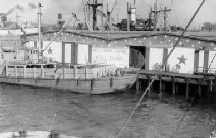
Marseilles was a nice enough town to visit. It was a lot different from Paris which I had visited in April of 1945.
A little bit of Paris . . . We had been in Holland for a few months and had been in some mine fields clearing work, rather risky and dirty work. I don't know if my Lt. recognized some early signs of combat fatigue, but one day he just came up to me and handed me a 3 day pass to the "City of Lights", Paris. I took it.
After a trip across Holland and Belgium in a European Box Car, Sgt. Kalwerth and I arrived in Paris. I had my 3 week cigarette ration in my musette bag which was to finance my three day pass in the famous French city of Paris.
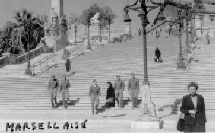
The Black Market did come to my rescue. On returning to Holland after 3 days in Paris I had more money in my wallet then when I had left for Paris, but with no cigarettes.
The army had taken over a very famous hotel, the Hotel De La Paree and ran it for "R & R" G.I.'s on pass or leave. The Rainbow Circle G.I. Club was practically next door to the Hotel. Glen Millers Air Force Band played nightly at the Club of course Glen Miller was not leading the Band as he had disappeared over the English Channel in December of 1944. Ray McKinley was directing the band I guess.
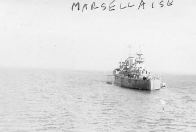
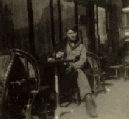
I enjoyed Paris. The food was good, an improvement over the army rations we had been living on in Holland. There was a lot to see. Went to see the Eiffel Tower, the Arch De Triumph and the Follies Bergere Bldg. I couldn't get tickets to the famous show. I went to a Catholic Mass Service at the famous Notre Dame Cathedral. The Mass at the Cathedral was a very moving service. The Red Robed Cardinals conducted the Mass, a French Choir sang the Mass. I left the service uplifted and was walking down the long steps in front of the Cathedral and I was approached by a Frenchman who tried to sell me "dirty French Pictures". I was not in that mood.
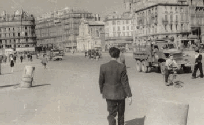
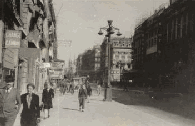
Rode the world famous Paris Subway and spent some very interesting nites in the Pigalle Section of the city. The G.I.'s called it "Pig Alley". Visited some bistros, had some classic French Cuisine.
I took a lot of pictures but unfortunately left my camera under a bench in a bar while waiting for our train. Guess we had a little too much champagne and completely forgot the camera under the seat. We didn't forget the 2 Magnums of Champagne we took back to Holland which we were to share with the 1st Platoon. (It never was shared. We drank it.)
Couldn't get to the world famous Gardens of Versailles, but purchased some very nice postcards. Even saw Napoleon's Tomb. Saw the naughty side of the city. You might say I enjoyed the wine, women and song of Paris in my April in Paris. Missed the song part, but didn't the rest.
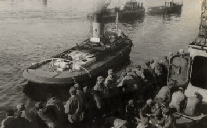
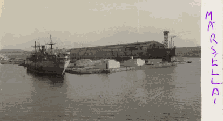
I spent almost two months at Camp Victoret. It was a long, boring, monotonous time. There just wasn't anything we could do. We couldn't spend our time in Marseilles because we didn't have any money to spend on our vices. Likewise we couldn't visit the other towns on the French Riviera like Nice or Grasse for the same reason. We were usually broke between the distribution of our rationed cigarettes and candy bars.
We really didn't have much to sell on the French Black Market except the cigarettes and candy. Our G.I. clothing and equipment was signed out to us and we were responsible for it. You couldn't sell your boots or field jackets as you needed them. It got real cold on that plateau at night. Some of the G.I.'s who had access to army supplies of clothes or equipment got rich off of the French Black Market in Marseilles and the other neighborhood towns.

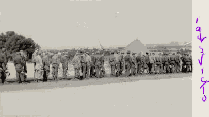
Thus while waiting for our turn to get on our boat I watched a lot of card playing and crap games that were going on at all hours of the day throughout the whole Camp Victoret Area. I just didn't have any money to participate. Talk about being frustrated.
I could not participate in the money making card or dice games but did learn how to play Pinochle. The Pinochle we played was called Race Horse Pinochle which was played with 2 Pinochle Decks of cards. I haven't played a game of Pinochle since I left Camp Victoret. The only other pastime was listening to our "local talent" usually some southerner from Texas or Georgia who played the guitar and sang those Hillbilly or Western tunes. It did break the monotony of life at Camp Victoret and its long days of inactivity. Must have heard "Down Yonder" 1000 times. The only good thing at Camp Victoret was the weather. It was ideal since Marseilles was located on the area known as the French Riviera.
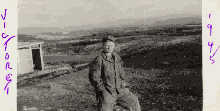
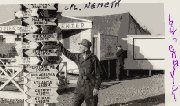
Close to the end of Nov. 1945 things did begin to happen. They posted "Shipment Orders" every day and I was listed as being transferred to an Ambulance Company located in Victoret for shipment back to the states on the St. Albans Victory Ship within the next few days. I reported to the Final Staging Area with my duffel bags which contained my total possessions. This included my German War Souvenirs which consisted of the three pistols I had picked up during my combat experiences and travels across France, Belgium, Czechoslovakia, Holland, Luxembourg, Austria and Germany.
The three guns which I had planned to bring back to the U.S. were a German Luger, A German P-38 Walther and an Italian Beretta. I later found out that I would be limited to boarding with only one pistol and had to dispose of two of my pistols. Another item was a pair of German Field Glasses or Binoculars and also a German S.S. Ceremonial Dagger.
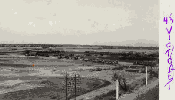

On reporting to the Staging Area to my Ambulance Company I found that I was only 1 of 7 1st Sgts. assigned to the Company for our return to the U.S.A. The Captain in charge of the Ambulance Company decided that the 1st Sgt with the most Seniority in the rank of 1st Sgt. would have the job. The assigned 1st Sgt, would handle the Administrative duties of the Company. I lucked out and had nothing to do except handle a squad of 12 soldiers.
After a day of preparation and required paperwork, we were taken by Army trucks to the docks where our Victory Ship, the St. Albans awaited. It was a very warm day as we waited on the Pier. The sun beat down on us unmercifully. We had noticed that there was a French bar close by. Time for a drink so we left the pier with our duffel bags with one of our non-drinking buddies.

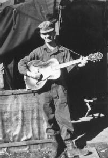
At the bar near the pier in Marseilles we had a few drinks of French wine and beer and ended up buying a couple bottles of Champagne to take with us on our voyage to the U.S.A. It was not to be. While we were waiting to board the St. Albans Victory; the Captain of the ship got on the P.A. System and made a series of announcements.
Two of the announcements effected me. The 1st called attention to some Army Regulation that limited the number of guns to take back to the U.S. to one. I had three. I was in trouble again, at least temporarily until I could get rid of two of my guns. The 2nd announcement called attention to an army Regulation that forbid the bringing of any alcoholic beverage on board any Army Transport that was carrying Military Personnel.
|